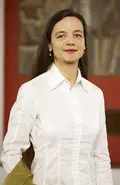Globalisation and Local Knowledge
Duration
09/2012
- 02/2016
Funding
Thüringer Ministerium für Bildung, Wissenschaft und Kultur (TMBWK),
Thüringer Ministerium für Wirtschaft, Wissenschaft und Digitale Gesellschaft (TMWWDG) :
300 000 Euro
Project management

Team
Dr. Norman Henniges
The research project is to be understood as a pilot project, which is intended to comprehensively demonstrate the research potential of the cartographic-geographical "The Gotha Perthes Collection" acquired by the Free State of Thuringia in 2003 for the first time. In addition, it is intended to contribute to the further development of the collection and to establish a virtual map laboratory, the "GlobMapLaboratory".
Up to now, the The Gotha Perthes Collection has been perceived by the scientific community and the general public primarily as a collection of maps. Maps also undoubtedly formed the centre of the Perthes publishing house's production, but map production only made up a small part of the publishing activities. From Gotha, geographic knowledge was not only mapped, popularized and sold, Perthes was also an institution where knowledge from all areas of geography and natural science was collected and processed in a wide variety of media. Even for contemporaries, Perthes was not a passive distribution channel for geographical products, but - comparable to a university or scientific research institution - one of the most important and lively hubs of the "geographic scholarly republic", especially in the 19th and early 20th centuries. The central position of the publishing house in the scientific landscape of the time is still reflected in the Perthes Collection today. As a working instrument of the publishing house, it contains not only the map collection, but also groups of material that have been less noticed to date, which are like a chain between the first field observations and the cartographic end products: Survey records, field notes, map sketches, travel diaries and correspondence, working diaries of cartographers, copper plates, company archives such as account books, an extensive specialist geographical library and loose-leaf collections of detailed information in metres. However, the interplay of the most diverse groups of material, which is unique in this density of tradition, has so far hardly been noticed by cultural historical research. The Perthes Collection is also one of the few archives in international comparison that was not organized as a university or library, but rather as a business, and at the same time acted as a decisive motor of scientific research. There is hardly any other comparative collection that allows us to comprehend economies of knowledge in such a density and complexity of tradition as the Gotha Collection.
The project examines the uniquely interlinked material groups of the collection in their context using case studies and, based on these, develops long-term strategies for innovative collection-related and third-party-funded research. Closely linked to this is the GlobMapLab, which presents selected materials and results of the case studies and provides digital maps of the Perthes Collection. As a result, the profile of the Gotha Research Centre is to be expanded to include the focal point "Collection-Related History of Knowledge and Science of Globalisation in Modern Times", the existing infrastructure is to be strengthened and the map laboratory is to be transferred into a virtual research environment for network-based scientific work in research and teaching.
The project is intended to make an important contribution to the Free State of Thuringia's energetic efforts to develop Gotha into the Baroque Universe, the second cultural heart of Thuringia next to Cosmos Weimar, and to a supra-regional and international profile of Thuringia's scientific collection and research landscape.
Further Information
More about the virtual map laboratory GlobMapLab (German only)
